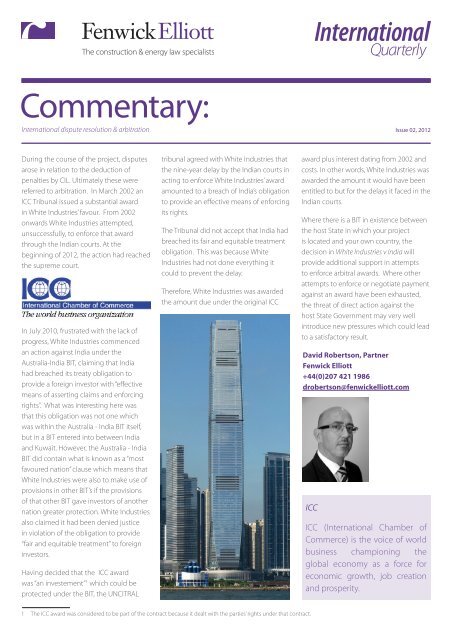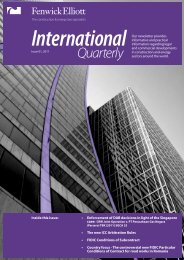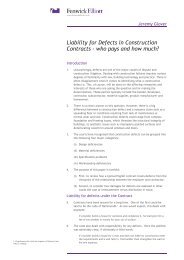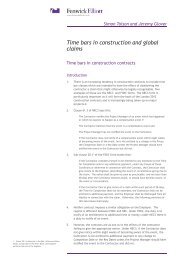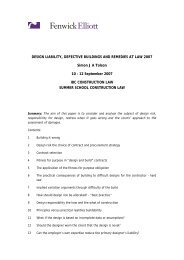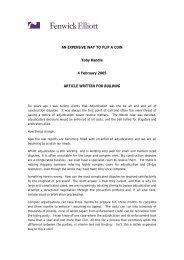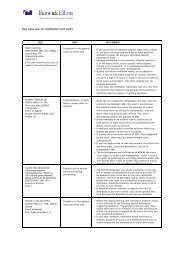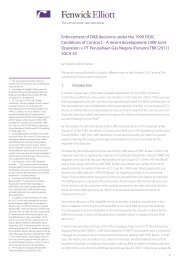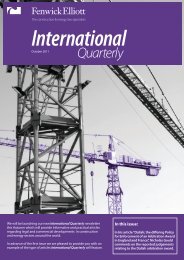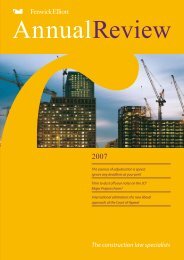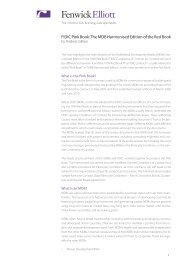download PDF - Fenwick Elliott
download PDF - Fenwick Elliott
download PDF - Fenwick Elliott
Create successful ePaper yourself
Turn your PDF publications into a flip-book with our unique Google optimized e-Paper software.
Commentary:<br />
International dispute resolution & arbitration<br />
Issue 02, 2012<br />
During the course of the project, disputes<br />
arose in relation to the deduction of<br />
penalties by CIL. Ultimately these were<br />
referred to arbitration. In March 2002 an<br />
ICC Tribunal issued a substantial award<br />
in White Industries’ favour. From 2002<br />
onwards White Industries attempted,<br />
unsuccessfully, to enforce that award<br />
through the Indian courts. At the<br />
beginning of 2012, the action had reached<br />
the supreme court.<br />
In July 2010, frustrated with the lack of<br />
progress, White Industries commenced<br />
an action against India under the<br />
Australia-India BIT, claiming that India<br />
had breached its treaty obligation to<br />
provide a foreign investor with “effective<br />
means of asserting claims and enforcing<br />
rights”. What was interesting here was<br />
that this obligation was not one which<br />
was within the Australia - India BIT itself,<br />
but in a BIT entered into between India<br />
and Kuwait. However, the Australia - India<br />
BIT did contain what is known as a “most<br />
favoured nation” clause which means that<br />
White Industries were also to make use of<br />
provisions in other BIT’s if the provisions<br />
of that other BIT gave investors of another<br />
nation greater protection. White Industries<br />
also claimed it had been denied justice<br />
in violation of the obligation to provide<br />
“fair and equitable treatment” to foreign<br />
investors.<br />
Having decided that the ICC award<br />
was “an investement” 1 which could be<br />
protected under the BIT, the UNCITRAL<br />
tribunal agreed with White Industries that<br />
the nine-year delay by the Indian courts in<br />
acting to enforce White Industries’ award<br />
amounted to a breach of India’s obligation<br />
to provide an effective means of enforcing<br />
its rights.<br />
The Tribunal did not accept that India had<br />
breached its fair and equitable treatment<br />
obligation. This was because White<br />
Industries had not done everything it<br />
could to prevent the delay.<br />
Therefore, White Industries was awarded<br />
the amount due under the original ICC<br />
award plus interest dating from 2002 and<br />
costs. In other words, White Industries was<br />
awarded the amount it would have been<br />
entitled to but for the delays it faced in the<br />
Indian courts.<br />
Where there is a BIT in existence between<br />
the host State in which your project<br />
is located and your own country, the<br />
decision in White Industries v India will<br />
provide additional support in attempts<br />
to enforce arbitral awards. Where other<br />
attempts to enforce or negotiate payment<br />
against an award have been exhausted,<br />
the threat of direct action against the<br />
host State Government may very well<br />
introduce new pressures which could lead<br />
to a satisfactory result.<br />
David Robertson, Partner<br />
<strong>Fenwick</strong> <strong>Elliott</strong><br />
+44(0)207 421 1986<br />
drobertson@fenwickelliott.com<br />
ICC<br />
ICC (International Chamber of<br />
Commerce) is the voice of world<br />
business championing the<br />
global economy as a force for<br />
economic growth, job creation<br />
and prosperity.<br />
1 The ICC award was considered to be part of the contract because it dealt with the parties’ rights under that contract.


